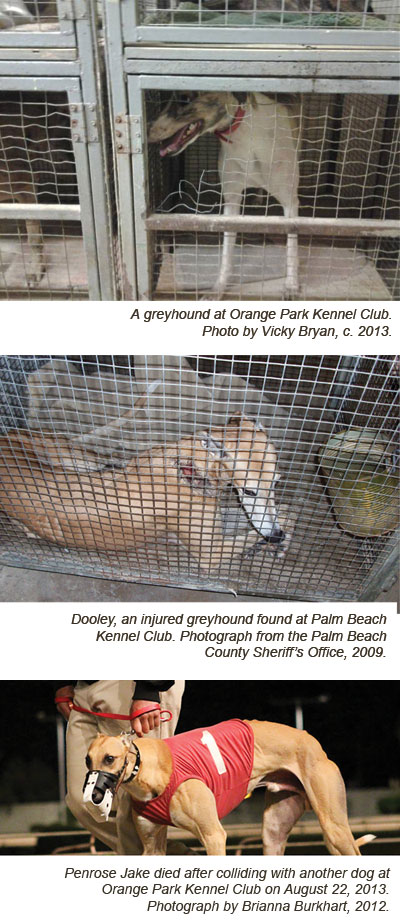 Dog Racing in Florida
Dog Racing in Florida
There are twelve commercial dog tracks in Florida. This represents a majority of all greyhound tracks (12 of 21) left in the United States.
Humane Problems
Many humane problems have been documented at Florida tracks. As a result, every major humane organization supportsthe complete end of commercial dog racing.
- At Florida tracks, an estimated 8,000 greyhounds endure lives of confinement. They are kept in warehouse style kennel compounds, inside metal cages that are barely large enough for the dogs to stand up or turn around. Greyhounds are confined in these cages for up to 23 hours per day. The minimum cage size requirement is 36 inches, by 24 inches, by 32 inches.
- 367 racing greyhounds have died in Florida since 2013, according to state records. On average, a greyhound dies every three days.
- While at the track, greyhounds are fed raw “4-D” meat from downed animals, and female greyhounds are routinely given anabolic steroids to prevent estrus.
- At least 21 greyhounds have tested positive for cocaine after racing at Florida dog tracks since 2008.
- Since 2008, eight serious cases of greyhound neglect have been documented at Florida dog tracks.
Injury Reporting
Greyhound injuries like broken legs and necks, and paralysis are common in the racing industry. Unfortunately, Florida is one of only two states, with Alabama, that doesn’t report greyhound injuries to the public. In states where greyhound injury reporting laws have passed, the number of racing dogs placed for adoption rather than destroyed has dramatically increased.
Dog track owners oppose injury reporting because they don’t want the public to know how many dogs are being hurt.
A Dying Industry
Greyhound racing is no longer economically viable. In 2013, the legislature retained an independent research firm named Spectrum Gaming Group to conduct a study on gambling in Florida. In part, this study found that:
- Greyhound racing is "clearly in serious decline."
- The state is losing between $1 million and $3.3 million on dog racing, because regulatory costs exceed revenues.
- Between 1990 and 2012, racetrack gambling at Florida dog tracks declined by 67% and gambling on live dog races fell by 90%.
- At the same time that dog race gambling has sharply declined, the number of greyhound performances has dropped by only 6% because of state dog racing mandates.
- "Only three tracks made a profit" on greyhound racing in 2012. Collectively, Florida dog tracks lost $35 million on greyhound racing.
